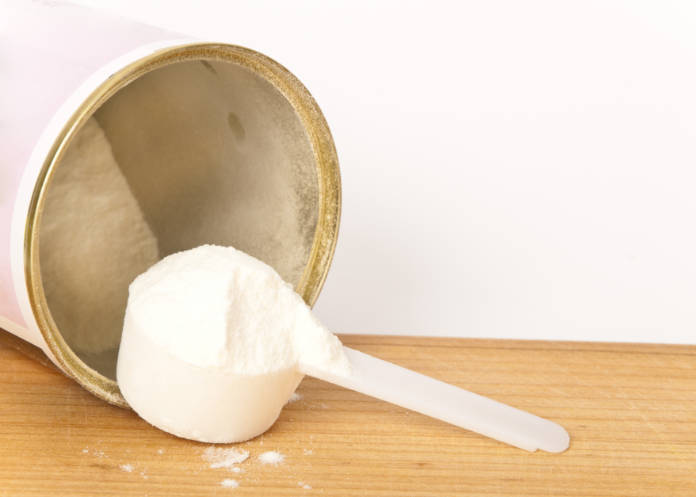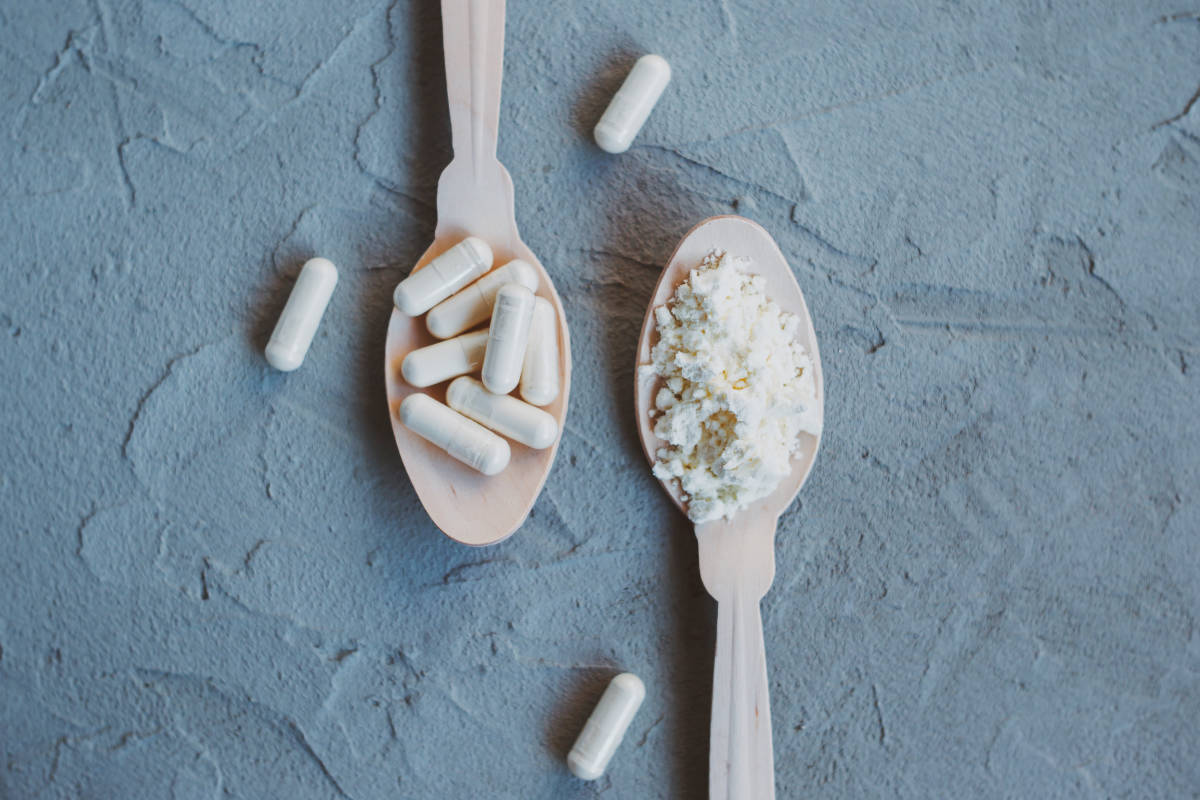Collagen has been a buzzword in the wellness industry since the mid-1990s, heralded for its plumping and preserving properties. But while this protein is well known for its cosmetic benefits, its uses are far more than skin deep. Collagen is the most abundant protein in the human body and provides an essential function in supporting our muscles, joints, blood vessels and immune system.
Sadly, as early as age 25, our body’s collagen content depletes at a rate of 1.5% each year. This loss of the protein shows itself in reduced flexibility, weaker muscles and of course, less firm skin. Luckily, there is a range of supplements that can boost our collagen levels.
But with such an array of collagen products on the market, which one should you choose? How can you tell which collagen is right for you? What’s the best way to take it? We answer these questions and more in our definitive guide on the best way to take collagen below.
What are the different types of collagen?
Before you set about cranking up your collagen, it’s important to differentiate between the different kinds available. There are four main types of collagen that we humans produce and each one performs very different functions.
The main forms of collagen are:
Type 1 – this is what we typically think of when collagen is mentioned. This kind of collagen is related to the appearance of our skin. Many collagen supplements are made with mainly type 1, which promotes a healthy and youthful appearance.
Type 2 – this helps to maintain elastin, another protein which provides elasticity to our skin but also to our joints and cartilage. The less Type 2 collagen we produce, the longer it will take for the body to recover from a workout or exertion.
Type 3 – this is the second most abundant type of collagen our body produces and has nothing to do with fending off crow’s feet. Type 3 collagen helps calm inflammation around muscles and maintains our overall health. This is the type of collagen that boosts our immunity and keeps us healthy overtime.
Various other types of collagen work as intracellular proteins in our body, helping maintain tissues such as those in the deeper layers of our dermis which essentially helps our skin heal and rejuvenate faster.
Taking any type of collagen will ultimately improve your physical condition, but it’s important to be selective if you have a particular collagen goal in mind. If you’re dead-set on improving your joint flexibility, increasing your immunity or simply freshening up your complexion, take time to investigate what type of collagen a supplement contains before deciding on the best one for you.
Where does commercial collagen come from?
While there are various supply chains for collagen in health supplements, the primary source is cattle. Bovine collagen is extracted from the skin and muscles of cows, which may sound odd, but harvesting beauty products from livestock is a far-from-modern practice. In ancient China, famous beauty Yang Yuhan (719-756 AD) attributed her luminous skin to a daily dose of Ejao soup, made from donkey hide gelatine.
Swimming into second place for popularity is marine collagen, taken from the skin, bones and scales of fish, mostly freshwater species including Pangasius and Tilapia.
There has been a sharp increase in the number of vegan collagen products on the market. These are often sourced from seaweed and don’t contain any collagen, rather they contain elements such as vitamins C and E which stimulate the body’s own collagen production. A fully vegan collagen called Biollagen synthesised from a fungus called P.pastoris was patented in 2020, but is not yet available on the market.
Whether you source your collagen from meat, fish or fungus, there are a plethora of ways to get your dose. But what is the best way to take collagen?
What’s the best way to take collagen?
Our research has returned the best collagen products on the market and we’ve broken down the pros and cons just for you.
Collagen capsules
Swallowing a capsule is a quick and easy way to up your collagen intake. Usually made of gelatine or cellulose, collagen capsules tend to also include complimentary ingredients such as vitamin C.
PROS: Unlike other methods, there is no mess or preparation involved and the dosage is already measured out for you.
CONS: The downside is that a single tablet may not contain your full daily quota of collagen requiring you to pop several a day.
Vital Proteins offers Collagen Peptides Capsules with free standard delivery on all orders.
Collagen powder

Despite being a more recent addition to the supplement arena, collagen powder has quickly become the most popular option for those seeking a collagen fix. Coming as a fine white dust, powdered collagen consists of hydrolysed collagen peptides, which means the long-chain amino acids have been broken down into simpler components (peptides) for easier absorption by the body.
PROS: Collagen powder is ideal for stirring into drinks or sprinkling onto food which makes it easy to incorporate into your daily routine.
CONS: It can be bulky and some people find the powder has a distasteful flavour.
Simply Supplements sells its SimplyGo Marine Collagen Powder with over 500 5* TrustPilot reviews.
Collagen drinks, bars and creamers
For convenience (and flavour) some people opt for ready-made milkshakes, fruit teas and mineral waters on the market, along with collagen-containing snack bars and even marshmallows. The hottest addition to the collagen supplement family is coffee creamer, packing your daily collagen and caffeine fix into a single mug.
PROS: Having your collagen as a ready-made part of your diet is super convenient and you’re less likely to miss a dose.
CONS: These products tend to be expensive and are usually only available online.
Vital Protein’s Collagen Creamer Powder (Coconut 293g) includes free standard UK delivery on all orders.
Collagen gummies
Adding a little sweetness to your anti-ageing regime, collagen gummies utilise the substance’s naturally gelatinous properties.
PROS: These fruity beauty boosters are easy (and tasty) to take.
CONS: They tend to be packed with sugar and sweeteners making them less healthy.
Collagen liquid
If you prefer a more methodical approach to your collagen regimen, collagen liquid typically comes in pre-measured bottles like little collagen shots. These can be easily downed as part of your routine and the liquid form is easily ingested.
PROS: Very convenient and no measuring or mixing.
CONS: These liquids often contain artificial flavourings and there’s lots of packaging involved.
Gold Collagen’s Pure range is a liquid collagen supplement supports your immune system, skin and nails.
Collagen serums and cremes
There are a range of collagen-infused products for slathering directly onto your skin. These tend to be heavy cremes with a small amount of Type 1 collagen mixed in amongst other skin brightening ingredients.
PROS: Added benefit of moisturising skin and practising self-care.
CONS: Many so-called ‘collagen serums’ don’t contain any collagen, instead they contain ingredients which stimulate its production. While these products are still designed to boost your personal collagen content, some people prefer to ingest their collagen directly.
Collagen masks and patches
Sheet masks hail from Korea, which is generally accepted as the leading authority on skincare. Tissue masks and under-eye patches are usually impregnated with intense moisturisers such as hyaluronic acid, but they can also be permeated with collagen.
PROS: These single-use masks make direct contact with your skin, ensuring the collagen is evenly distributed and can penetrate deep into your skin.
CONS: This method only permeates the epidermis, so works on a solely surface level.
Gold Collagen’s Hydrogel Mask Set has been developed for dehydrated, tired-looking skin and provides immediate comfort, radiance and moisture.
Collagen injections
Prior to new developments in collagen peptides, injectable collagen was the most familiar form of the protein. Substances like lactic and hyaluronic acid have overtaken as filler favourites, but collagen is still used. The most common brands include Zyderm and Bellafill, both of which are sourced from cow skin, but collagen filler can also be sourced from deceased human donors.
This method involves a medical professional (please do your research) puncturing your dermis with a hypodermic needle and injecting a small amount (usually between 1 and 2 ml) of collagen into the skin’s structural layer.
PROS: Unlike other methods, injections target the exact area where you want more collagen. When done by a skilled professional the effects can be fast-acting and considerable.
CONS: Aside from the obvious price-tag, this method carries by far the greatest quota of risks, from site infection to blocked blood vessels and tissue death.
At present, there are no restrictions on who can buy dermal fillers in the UK. Fillers qualify as ‘non-surgical cosmetics’ and don’t come under the Medicines and Healthcare Products Regulatory Agency (MHRA). This means, anyone with public liability insurance and a vial of collagen is legally permitted to jab paying customers. We recommend visiting national register of accredited medical professionals Save Face if you’re considering the needle.
How should you take your chosen collagen?
Once you’ve determined what form of collagen is right for you, you need to take it correctly. Here are the answers to the four most common queries about how to take your collagen.
There have been some unfounded claims that taking collagen on a full stomach would result in the peptides being denatured by your stomach acid. This is nonsense. Collagen supplements can be taken with or without food. In fact, as your supplement is broken down into amino acids in the stomach, having your gut actively digesting food can aid the absorption process.
Morning, noon or night, a collagen supplement will still perform its primary function regardless. However, as the body’s repair processes are at their highest while we sleep, taking your dose at night could be a sensible choice. In terms of regularity, taking any kind of supplement at roughly the same time each day means you are less likely to forget, but this isn’t a requirement.
Within our systems, collagen interacts with a variety of other substances, in particular vitamin C which the body requires to manufacture collagen. Hyaluronic acid also sustains collagen as it retains moisture which collagen needs to stretch. These substances and other common additives such as vitamin D are all beneficial overall, so while not a necessary accompaniment to your collagen, they are recommended.
Prevention is better than a cure, so as your natural collagen production begins depleting at 25, we recommend topping up from your early 20s. However, as you age your collagen needs will change so it’s important to use this guide to identify which collagen is right for you at every life stage.
You may be interested in…
This article may include affiliate links to products and services where we may receive a small fee to support the running of this site if you make a purchase or is a sponsored article from one of our select editorial partners providing valuable advice and information to our readers.







































































